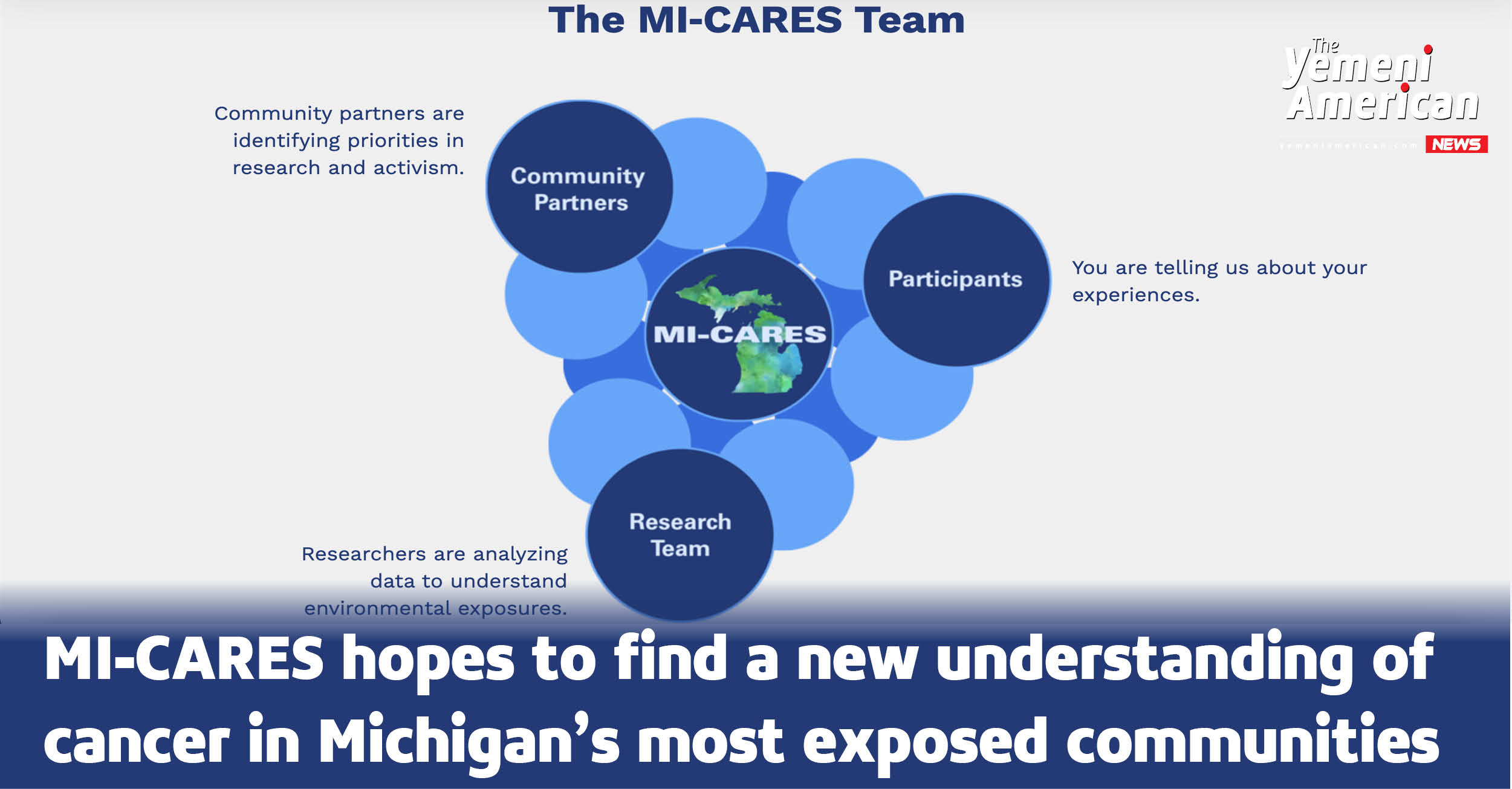MI-CARES hopes to find a new understanding of cancer in Michigan’s most exposed communities.
By Simon Albaugh – Yemeni American News
Dearborn, Mich. – Local leaders like Sam Luqman have seen their fair share of sickness. In Dearborn’s Southend, it almost seems inevitable. Neighbors getting a cancer diagnosis isn’t a rarity, according to Luqman. But research on the issue? Now that’s lacking.
“What do you need when you want to solve a problem?” Luqman said. “You have to know that the problem exists. And if there’s no research indicating that there’s increased rates of cancer, or increased rates of pollution-related illnesses in an area, then you don’t really have a problem, you just don’t know that the problem is there.”
Luqman was asked to help spread the word about a new research initiative coming out of the University of Michigan. Lead by academics in the university’s department of Environmental Health Sciences and Biostatistics, along with the department of Epidemiology, the MI-CARES research initiative hopes to make clear the problem in places across the state like Dearborn’s Southend.
MI-CARES was derived from a previous project from master’s students in the University of Michigan School of Environment and Sustainability. Using a screening tool that was later adopted by the Michigan Department of Environment, Great Lakes and Energy (EGLE), the researchers are looking to get a baseline understanding of participants’ exposure to industrial chemicals in some of the harshest environmental justice hotspots in Michigan.
Environmental justice hotspots are places where a variety of social and economic factors have led to an area’s disproportionate exposure to environmental hazards. In places like Dearborn’s Southend, where heavy industry surrounds the everyday lives of thousands, a study like this can highlight a lot about the community.
“Our goal is really to be able to have this data to give back to the communities for them to do what they want with it,” said Lilah Khoja, a Ph.D candidate with the University of Michigan department of Epidemiology. “…Our hope is really that, whatever our findings are, that it does cause positive change, or it does contribute to positive change.”
Dr. Justin Colacino, one of the researchers involved with the MI-CARES research initiative explains that the goal is larger than just collecting data. With a nation-wide consortium of similar studies being conducted, researchers involved with MI-CARES hope to definitively improve cancer research and care.
“There’s several important implications if our studies are successful,” said Dr. Colacino. “We will help to generate one of the largest nationwide datasets of exposure to potentially toxic chemicals in diverse individuals ever to exist. We will identify which of these chemicals are most likely to be linked to specific types of cancer, and what levels of exposure are most dangerous.
“This data is essential when government agencies like the Environmental Protection Agency are developing laws and regulations for chemicals. We will also work closely with community partners to ensure that they can use this data for advocacy and keeping their community members safe.”
But in order for this study to work, researchers are looking to enroll 100,000 people across the state of Michigan into the MI-CARES study, with an added focus on environmental justice hotspots like Dearborn’s Southend.
Participants are asked to verify where they live via zip code, and for some who live in environmental justice hotspots, they may be asked to give a saliva and blood sample through a simple process. Researchers with MI-CARES will then safely pick up the samples.
“So the process for enrolling in MI-CARES is really simple,” Khoja said. “You just go on our website, you do a little eligibility questionnaire to find out if you’re eligible – and the only eligibility requirements are that you live in Michigan and that you’re between the ages of 25-44.
“It then takes you to our consent form, and then you’re asked to do our questionnaire… And then the way we’re verifying where people live is by zip code. And so if your zip code places you in one of six hotspot areas, you might be asked to provide a saliva and blood sample.”
Researchers use the samples to test for exposure to industrial chemicals. Along with testing the samples, researchers will occasionally check in with participants to get updates on health status. The hope is that this will lead to a fuller understanding of the relationship between industrial chemical exposure and cancer rates.
“There are over 80,000 chemicals which are used in commerce, and we are still lacking the data to understand the health effects of many of these chemicals,” Colacino said. “This is where this new large study comes in.
“Through MI-CARES, our goal is to engage with a diverse coalition of Michiganders to understand what major toxic chemicals people across the state are exposed to and test whether these chemicals may alter people’s risk of developing cancer… Our goal as part of this study is to test whether these exposures may impact cancer in our state.”
If you would like to enroll with MI-CARES and participate in an effort to understand cancer in the state of Michigan, go to the MI-CARES website and follow the prompts.













